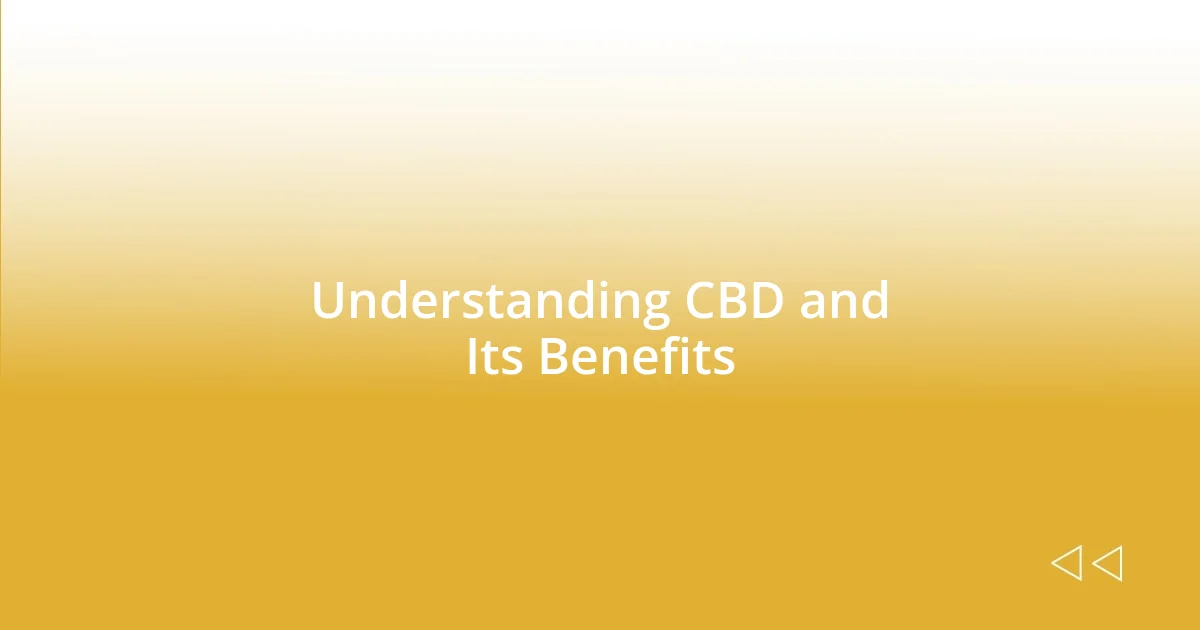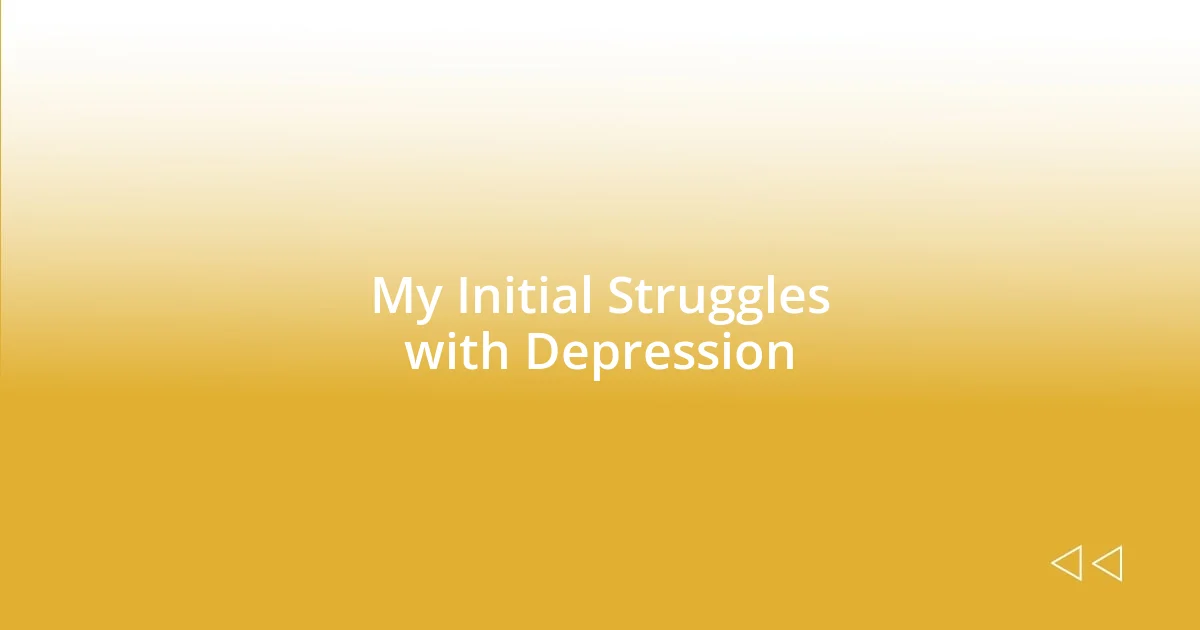Key takeaways:
- CBD is a non-psychoactive compound that may alleviate symptoms of depression and anxiety without the side effects of traditional medications.
- Research suggests that CBD may enhance serotonin signaling, reduce anxiety, and has neuroprotective properties, although individual responses vary.
- Choosing a quality CBD product involves understanding forms, ensuring third-party lab testing, and focusing on effective concentration rather than just price.

Understanding CBD and Its Benefits
Cannabidiol, commonly known as CBD, is a compound derived from the hemp plant. Unlike THC, which is notorious for its psychoactive effects, CBD doesn’t alter one’s state of mind. I remember when I first discovered this distinction—it felt like a breath of fresh air, knowing that I could explore the potential benefits without the worry of feeling “high.”
One of the most appealing aspects of CBD is its potential to alleviate symptoms of depression and anxiety. For me, it was a turning point when I realized that CBD could support my mental health journey without the side effects often associated with traditional medications. Have you ever felt overwhelmed by pharmaceutical options? It’s a common struggle, and CBD presents a more natural alternative worth considering.
CBD is known to interact with our body’s endocannabinoid system, which plays a crucial role in regulating mood and stress responses. When I started incorporating it into my routine, I noticed a greater sense of calm and balance in my daily life. It raises an intriguing question: can a plant-based compound truly shift our mental well-being? Based on my experience, I believe it can, but of course, everyone’s journey is unique.

My Initial Struggles with Depression
Experiencing the weight of depression can often feel like an isolating journey. I vividly remember days where getting out of bed seemed monumental; simple tasks became insurmountable hurdles. There were moments when I’d find myself staring at the ceiling, pondering the purpose of my struggles, and it often felt like I was trapped in a fog with no clear way out.
As I navigated through this tumultuous time, my mental landscape seemed to shift daily. Some days, I would find fleeting solace in laughter with friends, while other days, the shadows felt almost suffocating. I often questioned whether I would ever experience joy again—the kind that doesn’t feel forced or fleeting. It doesn’t take much for someone living with depression to feel as though they’re standing at the edge of a precipice, uncertain of their next step.
I remember one particular evening, sitting alone in my dimly lit room, feeling utterly consumed by sadness. It struck me how exhausting it was to wear a mask of normalcy while grappling with such profound internal battles. It was during these reflective times that I realized I needed a change—something to help lift the weight, and that’s when my thoughts began to drift towards alternatives like CBD.
| My Feelings | My Actions |
|---|---|
| Overwhelmed by sadness | Isolated in my room |
| Hopeful yet doubtful about recovery | Engaged in superficial social interactions |
| Questioning my happiness | Searching for alternatives to medication |

Researching CBD for Depression Relief
Researching CBD for depression relief involved delving into a labyrinth of studies and anecdotal experiences. I found myself sifting through various scientific articles, each one unveiling a layer of understanding about how CBD may impact mood regulation. It was enlightening. I recall a moment of revelation when I came across research suggesting that CBD might influence serotonin levels—something I had read extensively about but didn’t fully grasp until I saw the evidence laid out before me.
Here are some key insights I gathered during my research:
- Serotonin Interaction: CBD may enhance serotonin signaling in the brain, which is crucial for mood stabilization.
- Anxiety Reduction: Some studies indicate that CBD can significantly decrease anxiety, making it easier to cope with depressive symptoms.
- Neuroprotective Properties: CBD may help in promoting brain health, potentially warding off the cognitive decline often associated with long-term depression.
- Individual Variability: It’s essential to remember that responses to CBD can differ from person to person, which adds another layer of complexity to its therapeutic potential.
I also remember engaging with online communities and hearing heartfelt testimonies from individuals who had experienced transformative effects from CBD. One person’s success story struck a chord with me—how they described slowly reclaiming their life from the grips of depression, thanks to this natural remedy. This collective knowledge allowed me to approach my own exploration of CBD with cautious optimism, reinforcing the idea that I wasn’t alone on this journey.

Choosing the Right CBD Product
When it comes to choosing the right CBD product, I found it immensely helpful to first understand the different forms available. I remember standing in a health store, scanning the shelves filled with oils, capsules, gummies, and creams. Each option seemed appealing at first glance, but I had to remind myself—what did I actually want to achieve? For me, a tincture was ideal since it offered flexibility in dosage, allowing me to start small and adjust as needed depending on how I felt.
I also realized that quality matters more than anything. After some digging, I discovered the significance of third-party lab testing; only products with transparent lab results made it to my shortlist. I vividly recall contacting a few companies to ask about their sourcing and testing processes. It was reassuring to chat with knowledgeable representatives who understood my concerns and provided clear answers. They genuinely seemed committed to consumer well-being, which, after all, was my top priority.
Price is another factor I struggled with when selecting a product. I once splurged on a high-end CBD oil that came with a price tag to match its fancy branding, only to find it didn’t help me at all. This experience taught me that effectiveness isn’t tied to cost. Instead, I now focus on understanding the concentration of CBD and the overall ingredients. Have you considered what really matters in your selection process? Sometimes, it’s the less flashy options that can pack the most therapeutic punch.

Observing Changes and Effects
As I began using CBD, I made it a point to journal my daily experiences. It became fascinating to observe subtle shifts in my mood and anxiety levels. One morning, after taking a dose, I noticed a calming wave washing over me. It felt different—not the overwhelming numbness I had often faced, but a gentle easing of my worries. This awareness prompted me to ask myself, “Could this be the beginning of a new chapter?”
Over the weeks, I found myself analyzing not just how I felt but also the nuances of my interactions. Friends remarked that I seemed more present during conversations, laughing more freely than I had in ages. I remember a coffee date where, instead of feeling like I was trapped in my thoughts, I could genuinely enjoy my friend’s stories. It left me wondering: had CBD unlocked not just relief from depression but a deeper connection with those around me?
Yet, I have to emphasize the variability. I tried different dosages and formulations, eagerly tracking those changes. After a couple of weeks with a higher dose, I returned to my baseline mood, almost as if my body had adjusted. This taught me that while CBD showed promise, it’s crucial to remain adaptable. What worked for me might not resonate with someone else. Have you faced similar challenges in finding the right balance? It’s all part of the journey, and I believe that understanding these shifts is essential to making informed decisions about our mental health.















